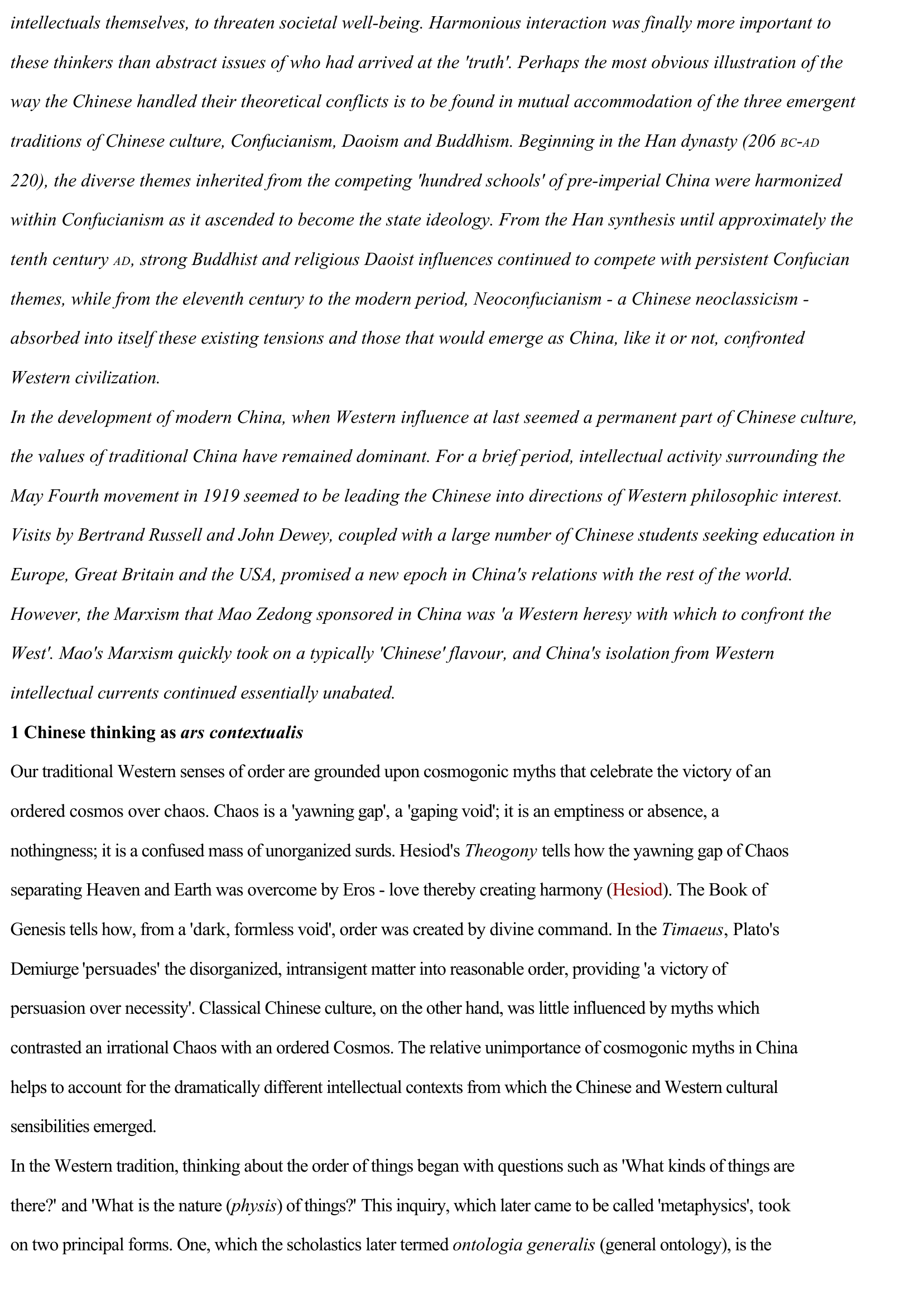Chinese philosophy
Publié le 22/02/2012

Extrait du document
«
intellectuals themselves, to threaten societal well-being.
Harmonious interaction was finally more important to
these thinkers than abstract issues of who had arrived at the 'truth' .
Perhaps the most obvious illustration of the
way the Chinese handled their theoretical conflicts is to be found in mutual accommodation of the three emergent
traditions of Chinese culture, Confucianism, Daoism and Buddhism.
Beginning in the Han dynasty (206 BC-AD
220), the diverse themes inherited from the competing 'hundred schools' of pre-imperial China were harmonized
within Confucianism as it ascended to become the state ideology.
From the Han synthesis until approximately the
tenth century AD, strong Buddhist and religious Daoist influences continued to compete with persistent Confucian
themes, while from the eleventh century to the modern period, Neoconfucianism - a Chinese neoclassicism -
absorbed into itself these existing tensions and those that would emerge as China, like it or not, confronted
Western civilization.
In the development of modern China, when Western influence at last seemed a permanent part of Chinese culture,
the values of traditional China have remained dominant.
For a brief period, intellectual activity surrounding the
May Fourth movement in 1919 seemed to be leading the Chinese into directions of Western philosophic interest.
Visits by Bertrand Russell and John Dewey, coupled with a large number of Chinese students seeking education in
Europe, Great Britain and the USA, promised a new epoch in China's relations with the rest of the world.
However, the Marxism that Mao Zedong sponsored in China was 'a Western heresy with which to confront the
West' .
Mao's Marxism quickly took on a typically 'Chinese' flavour, and China's isolation from Western
intellectual currents continued essentially unabated.
1 Chinese thinking as ars contextualis
Our traditional Western senses of order are grounded upon cosmogonic myths that celebrate the victory of an
ordered cosmos over chaos.
Chaos is a 'yawning gap' , a 'gaping void'; it is an emptiness or absence, a
nothingness; it is a confused mass of unorganized surds.
Hesiod's Theogony tells how the yawning gap of Chaos
separating Heaven and Earth was overcome by Eros - love thereby creating harmony ( Hesiod ).
The Book of
Genesis tells how, from a 'dark , formless void' , order was created by divine command.
In the Timaeus , Plato's
Demiurge 'persuades' the disorganized, intransigent matter into reasonable order, providing 'a victory of
persuasion over necessity' .
Classical Chinese culture, on the other hand, was little influenced by myths which
contrasted an irrational Chaos with an ordered Cosmos.
The relative unimportance of cosmogonic myths in China
helps to account for the dramatically different intellectual contexts from which the Chinese and Western cultural
sensibilities emerged.
In the Western tradition, thinking about the order of things began with questions such as 'What kinds of things are
there? ' and 'What is the nature ( physis ) of things? ' This inquiry, which later came to be called 'metaphysics' , took
on two principal forms.
One, which the scholastics later termed ontologia generalis (general ontology), is the.
»
↓↓↓ APERÇU DU DOCUMENT ↓↓↓
Liens utiles
- Confucian philosophy, Chinese
- POUR UNE PHILOSOPHIE DE LA SOLITUDE [A Philosophy of solitude]. (résumé) de John Cowper Powys
- RENAISSANCE CHINOISE (La) [The Chinese Renaissance]. Hou-che (résumé)
- Bertrand Russell par Anthony Quinton University Lecturer in Philosophy and Fellow of New College Oxford Incessamment actif, Bertrand Russell a passé longue vie en public.
- Chinese Shar-Pei.


